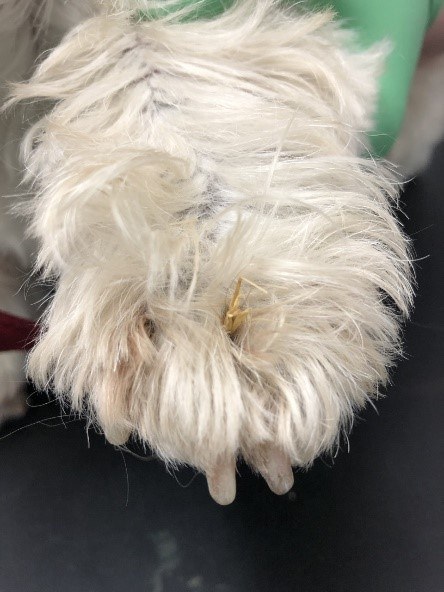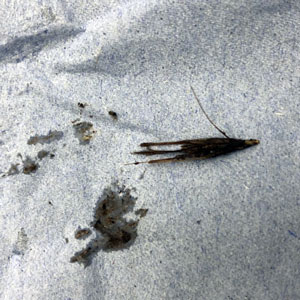As pet owners, we work hard to make sure that our four-legged pets are secure and happy. However, some dangers can go unseen.
For instance, grass seeds in Dogs’ paws are a cause for alarm. Although grass seeds may appear to be unharmful, if they are not swiftly removed, they can lead to discomfort, suffering, and even major health problems. Here at Alder Vets in Guildford Surrey, we can explain the risks associated with grass seeds in dogs' paws to provide preventive measures to keep your canine companion safe and healthy, alongside treatments should you require medical assistance.
Grass Seed in Dogs’ Paws Treatments from Alder Vets in Guildford
At Alder Vets in Guildford, Surrey, we are professional and experienced in providing treatments for a wide range of illnesses in pets, including Grass Seed in Dogs’ paws. Our team of veterinary professionals provide a thorough, friendly and calm service, ensuring your pet is comfortable and happy the whole time they are with us.
Please contact the clinic for more details and treatment if you believe there is Grass Seed in your Dogs’ paws. A veterinarian will assess your dog so they can create a personalised treatment plan. This could entail anything from local anaesthesia to a full general anaesthetic in order to extract the seed, treat the infection, and deliver therapy.
The Risk of Grass Seeds in Dogs' Paws
Grass seeds, also known as awns, are small, sharp structures found in grasses and plants. When dogs walk through areas with long or dry grass, these seeds can become trapped in their paws. The structure of grass seeds allows them to easily attach to the fur and penetrate the skin, leading to various complications.
Grass seeds in Dogs’ Paws can cause immediate irritation and discomfort. The sharp edges can pierce the skin, leading to redness, swelling, and pain. Dogs may exhibit signs of distress, such as limping, licking or chewing at their paws, and reluctance to walk or put weight on the affected limb. Additionally, if a grass seed is left in your dog's paw for a long time, it may open a doorway for bacteria. The likelihood of infection rises as a result. Persistent swelling, discharge, heat, and an unpleasant odour coming from the affected area are typical indicators of infection. To avoid additional complications, infections require immediate veterinary care.
In some cases, Grass Seed in Dogs’ paws can migrate further, forming an abscess or a fistula. An abscess is a localized collection of pus, while a fistula is an abnormal tunnel that forms as a result of the body's attempt to expel the foreign object. These conditions can be painful and may require surgical intervention to remove the grass seed and treat the affected area.
Read more on the dangers here
Preventive Measures to Protect From Grass Seed in Dogs’ Paws
Preventive measures can significantly reduce the risk of embedded grass seeds in Dogs’ paws. Here are some steps you can follow:
Regular Paw Checks: Make it a habit to check your dog's paws regularly, especially after outdoor activities. Inspect between the toes, pads, and paw pads for any signs of grass seeds, thorns, or foreign objects. If you notice anything lodged in the paw, remove it carefully using tweezers or seek veterinary assistance if needed.
Grooming and Trimming: Regular grooming and paw maintenance can help prevent grass seeds from becoming entangled in your dog's fur. Trim the hair around the paws, keeping it short and well-maintained. This reduces the chances of seeds getting caught in the fur and subsequently penetrating the skin.
Protective Paw Wear: Consider using protective paw wear, such as booties or socks, when walking your dog in areas with long or dry grass. These can create a physical barrier between the paws and potential hazards, reducing the risk of grass seeds becoming embedded.
Avoid Problematic Areas: Be mindful of areas known to have grass seeds or where vegetation is overgrown. Avoid walking your dog in these locations, especially during the grass seeding season. Stick to well-maintained paths and grassy areas that are regularly cut and cleared.
Professional Landscaping: If you have a backyard or garden, ensure proper landscaping practices to minimize the presence of long, dry grasses and potential grass seed hazards. Regularly mow the lawn, remove weeds, and keep the vegetation well-maintained.
When To Seek Assistance With Alder Vets For Grass Seed In Dogs Paw
It’s important to seek veterinary assistance if you notice any signs of discomfort or if you suspect that grass seed in your dog's paw. Here are some situations that warrant veterinary attention:
Persistent Limping or Reluctance to Walk: If your dog is limping or showing reluctance to walk or put weight on a particular paw, it could be a sign of pain or injury. Grass seeds may cause such symptoms, and a veterinarian can examine the paw to determine the underlying cause.
Excessive Licking, Chewing, or Pawing at the Paw: If you notice that your dog is excessively licking, chewing, or pawing at a specific paw, it may indicate irritation or discomfort. Grass seeds can cause irritation, and a veterinarian can assess the paw to identify and address the issue.
Swelling, Redness, or Discharge: Swelling, redness, or any discharge from the paw could be signs of infection or inflammation. If you suspect that a grass seed has caused an infection, it's essential to have a veterinarian examine the paw and provide appropriate treatment.
Difficulty in Removing the Grass Seed: If you've attempted to remove a grass seed from your dog's paw but were unable to do so safely or completely, it's best to seek veterinary assistance. A veterinarian can use specialized tools and techniques to safely remove the grass seed without causing further harm.
Signs of Infection: If you notice signs of infection, such as persistent swelling, discharge, heat, or a foul odor coming from the paw, it's crucial to seek veterinary care promptly. Infections require proper treatment, including possible antibiotics, to prevent further complications.
The key to averting more severe problems brought on by grass seeds in dogs' paws is early discovery and treatment. It's best to visit a veterinarian if you have any worries or if your dog's symptoms intensify or continue. They can assure your beloved friend's wellbeing, offer an accurate diagnosis, and suggest the best course of action.
Book An Appointment With Alder Vets Today
If you need medical assistance for Grass seed in your Dogs’ Paws, call us straight away on 01483 536 036 or book an appointment with Alder Vets.
Spread the cost of essential healthcare for your pet

To spread the cost of routine and essential healthcare for your pet, we offer our Pet Health for Life plan, which includes an annual health check, vaccinations, microchipping, 2 vet consultations, 2 nurse consultations and discounts on services.







We are open 6 days a week in Guildford
Find us